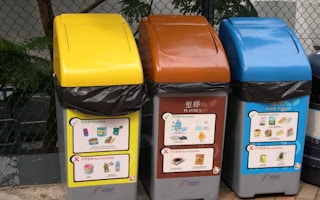Hong Kong’s three-coloured bin system for recycling seems simple enough: paper and cardboard goes into the blue, aluminium cans in the yellow and plastics in the brown. Of the first two there is no drama, with ready demand and profits to be made. But plastics pose a problem for recyclers in that there are many types, but only a few that are considered locally to be worth recycling. Invariably, about 85 per cent of the plastics we throw away end up not being turned into useful items, but into landfills.
With our landfills nearing capacity - they will be full by 2019 unless they can be enlarged - that is an absurd situation. It is being exacerbated by the mainland’s Operation Green Fence, an eight-month campaign that targets waste smuggling. Most plastic for recycling was being processed across the border, but it is either being stockpiled or dumped until the operation ends in November. Another curiosity is that it is cheaper for recyclers to bring in pre-sorted waste plastics from overseas.
Education would help, but it is also true that residential recycling of plastics is an unattractive proposition for companies because of the high costs of collecting, separating and processing. Making new plastics is more often than not less expensive. Hong Kong being a free market, and the government’s policy of ensuring a level playing field for business, mean that there are scant incentives on offer for recyclers. Unless a profit can be made, the majority of waste plastic ends up in landfills.
Recycling is a key part of the government’s new waste management strategy, but it will only be effective if there is a use for the material that is recycled. For that to happen, there have to be incentives to conserve, to create a society that is less disposable and an economy that is more reusable. It may be necessary to adopt the polluter-pays principle, whereby companies responsible for creating the waste should also take charge of cleaning up the mess. That would put the onus on manufacturers and retail distributors to ensure responsible packaging that is less wasteful and environmentally friendly.
But another part of the equation lies in subsidies for recyclers. Until they are able to turn a profit, they will need help for waste recovery and handling, especially if dealing in plastics. Consideration should be a priority for the steering committee led by Chief Secretary Carrie Lam Cheng Yuet-ngor that will meet this week to oversee the recycling sector.
This post originally appeared here.










